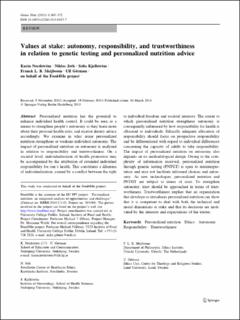Please use this identifier to cite or link to this item:
https://doi.org/10.21256/zhaw-21836Full metadata record
| DC Field | Value | Language |
|---|---|---|
| dc.contributor.author | Nordström, Karin | - |
| dc.contributor.author | Juth, Niklas | - |
| dc.contributor.author | Kjellström, Sofia | - |
| dc.contributor.author | Meijboom, Franck | - |
| dc.contributor.author | Görman, Ulf | - |
| dc.date.accessioned | 2021-02-25T09:07:52Z | - |
| dc.date.available | 2021-02-25T09:07:52Z | - |
| dc.date.issued | 2013 | - |
| dc.identifier.issn | 1865-3499 | de_CH |
| dc.identifier.issn | 1555-8932 | de_CH |
| dc.identifier.uri | https://digitalcollection.zhaw.ch/handle/11475/21836 | - |
| dc.description.abstract | Personalized nutrition has the potential to enhance individual health control. It could be seen as a means to strengthen people’s autonomy as they learn more about their personal health risks, and receive dietary advice accordingly. We examine in what sense personalized nutrition strengthens or weakens individual autonomy. The impact of personalized nutrition on autonomy is analyzed in relation to responsibility and trustworthiness. On a societal level, individualization of health promotion may be accompanied by the attribution of extended individual responsibility for one’s health. This constitutes a dilemma of individualization, caused by a conflict between the right to individual freedom and societal interests. The extent to which personalized nutrition strengthens autonomy is consequently influenced by how responsibility for health is allocated to individuals. Ethically adequate allocation of responsibility should focus on prospective responsibility and be differentiated with regard to individual differences concerning the capacity of adults to take responsibility. The impact of personalized nutrition on autonomy also depends on its methodological design. Owing to the complexity of information received, personalized nutrition through genetic testing (PNTGT) is open to misinterpretation and may not facilitate informed choices and autonomy. As new technologies, personalized nutrition and PNTGT are subject to issues of trust. To strengthen autonomy, trust should be approached in terms of trustworthiness. Trustworthiness implies that an organization that develops or introduces personalized nutrition can show that it is competent to deal with both the technical and moral dimensions at stake and that its decisions are motivated by the interests and expectations of the truster. | de_CH |
| dc.language.iso | en | de_CH |
| dc.publisher | BioMed Central | de_CH |
| dc.relation.ispartof | Genes & Nutrition | de_CH |
| dc.rights | Licence according to publishing contract | de_CH |
| dc.subject | Personalised nutrition | de_CH |
| dc.subject | Autonomy | de_CH |
| dc.subject | Genetic testing | de_CH |
| dc.subject.ddc | 613.2: Diätetik | de_CH |
| dc.title | Values at stake : autonomy, responsibility, and trustworthiness in relation to genetic testing and personalized nutrition advice | de_CH |
| dc.type | Beitrag in wissenschaftlicher Zeitschrift | de_CH |
| dcterms.type | Text | de_CH |
| zhaw.departement | Gesundheit | de_CH |
| zhaw.organisationalunit | Institut für Public Health (IPH) | de_CH |
| dc.identifier.doi | 10.1007/s12263-013-0337-7 | de_CH |
| dc.identifier.doi | 10.21256/zhaw-21836 | - |
| dc.identifier.pmid | 23504640 | de_CH |
| zhaw.funding.eu | No | de_CH |
| zhaw.issue | 4 | de_CH |
| zhaw.originated.zhaw | No | de_CH |
| zhaw.pages.end | 372 | de_CH |
| zhaw.pages.start | 365 | de_CH |
| zhaw.publication.status | publishedVersion | de_CH |
| zhaw.volume | 8 | de_CH |
| zhaw.publication.review | Peer review (Publikation) | de_CH |
| zhaw.author.additional | No | de_CH |
| zhaw.display.portrait | Yes | de_CH |
| Appears in collections: | Publikationen Gesundheit | |
Files in This Item:
| File | Description | Size | Format | |
|---|---|---|---|---|
| 2013_Nordstroem_etal_Values-at-stake.pdf | 117.68 kB | Adobe PDF |  View/Open |
Show simple item record
Nordström, K., Juth, N., Kjellström, S., Meijboom, F., & Görman, U. (2013). Values at stake : autonomy, responsibility, and trustworthiness in relation to genetic testing and personalized nutrition advice. Genes & Nutrition, 8(4), 365–372. https://doi.org/10.1007/s12263-013-0337-7
Nordström, K. et al. (2013) ‘Values at stake : autonomy, responsibility, and trustworthiness in relation to genetic testing and personalized nutrition advice’, Genes & Nutrition, 8(4), pp. 365–372. Available at: https://doi.org/10.1007/s12263-013-0337-7.
K. Nordström, N. Juth, S. Kjellström, F. Meijboom, and U. Görman, “Values at stake : autonomy, responsibility, and trustworthiness in relation to genetic testing and personalized nutrition advice,” Genes & Nutrition, vol. 8, no. 4, pp. 365–372, 2013, doi: 10.1007/s12263-013-0337-7.
NORDSTRÖM, Karin, Niklas JUTH, Sofia KJELLSTRÖM, Franck MEIJBOOM und Ulf GÖRMAN, 2013. Values at stake : autonomy, responsibility, and trustworthiness in relation to genetic testing and personalized nutrition advice. Genes & Nutrition. 2013. Bd. 8, Nr. 4, S. 365–372. DOI 10.1007/s12263-013-0337-7
Nordström, Karin, Niklas Juth, Sofia Kjellström, Franck Meijboom, and Ulf Görman. 2013. “Values at Stake : Autonomy, Responsibility, and Trustworthiness in Relation to Genetic Testing and Personalized Nutrition Advice.” Genes & Nutrition 8 (4): 365–72. https://doi.org/10.1007/s12263-013-0337-7.
Nordström, Karin, et al. “Values at Stake : Autonomy, Responsibility, and Trustworthiness in Relation to Genetic Testing and Personalized Nutrition Advice.” Genes & Nutrition, vol. 8, no. 4, 2013, pp. 365–72, https://doi.org/10.1007/s12263-013-0337-7.
Items in DSpace are protected by copyright, with all rights reserved, unless otherwise indicated.